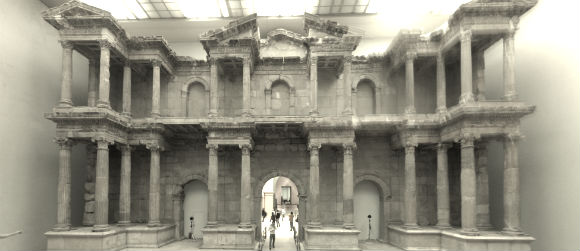Miletus is an ancient city which seems to have been inhabited by settlers between the end of the Minoan (1600 B.C.) and the Mycenean (1200 B.C.) periods, it was an important port at the mouth of the Meander (Menderes) River, a natural outlet for Phrygian trade. That trade was carried on with Egypt and with the several colonies Miletus started on the Black Sea. Among those Cyzicus and Sinope were founded before the mid-seventh century B.C.
Quite early the city was distinguished as the residence of philosophers and historians. Thales, who lived there from 640 to 546 B.C., is credited with being the founder of Greek geometry, astronomy, and philosophy. He predicted that an eclipse of the sun would occur in 585 B.C. It did on the 28th of May. He propounded the theory that the “world stuff” retains its identity unchanging. While his “stuff” was water, that train of thought has led scientists to nuclear physics today. Anaximander was associated with Thales in Miletus. Only fragments of his work are left. They show that he believed that the universe was a totality and that its phenomena were subject to laws rather than to the whims of the gods.
The famous hetarea Aspasia grew up there. Aspasia became the mistress of Pericles; her home in Athens was the salon for a famous group of writers and philosophers including Socrates.
Miletus was sacked by the Persians under Darius in 494 B.C. and he massacred its inhabitants. It was captured again by Alexander the Great in 334 B.C. But rather than being destroyed by carnage or looting, its end, like that of Ephesus, came because its harbor silted up and its commerce stopped. Lade which was once an island off the coast is now a hill far inland, and still the Meander River carries the soil of Anatolia farther and farther out into the Aegean. The bay of Miletus in early times separated it from Priene twenty kilometers to the north and extended east as far as Heracleia on the northeast shore of the Gulf of He-racleia, now Bafa Gölü.
Today one can climb around the impressive Greco-Roman theater and the Baths of Faustina. The main pari of the city is on low ground which often is flooded and therefore hard to see clearly. The city’s most important temple was located about twenty kilometers south in Didyma (Didim). It was the Temple of Apollo, the third largest structure in the Hellenic world, outdone only slightly by the Temple of Artemis in Ephesus and the temple in Samos. Associated with it was the oracle of Apollo which rivalled the oracle of Delphi In Greece In importance.
Paul’s visit to Miletus came at the end of his third journey as he was hurrying to get to Jerusalem by Pentecost. He had chosen to put in at Miletus rather than at Ephesus because, although he wanted to see the elders of the congregation there, he did not want to spend a lot of time in Asia. One suspects Paul would have been faced with a complicated series of social and business engagements if he had stopped at Ephesus. However, although the riot at Ephesus was only a few months past also, there is no suggestion in Luke’s account that Paul stayed away because of concern about hostility he might meet there.
The elders made the trip to Miletus and Paul spoke to them warning them to be alert in keeping watch over their flock and to work to support themselves and the weak because “happiness lies more in giving than in receiving” (Acts 20:35).
He told them he was going to Jerusalem because of an Inner compulsion, but he also predicted his approaching imprisonment. (That is, if one accepts the speech as being Paul’s and not an ex post facto composition of Luke’s.) “For myself, I set no store by life; I only want to finish the race, and complete the task which the Lord Jesus assigned to me, of bearing my testimony to the gospel of God’s grace” (Acts 20:24). He reminded them that he had been honest with them in giving them the full Christian message. Was he trying to say that this was not a mystery religion, the secrets of which were revealed only to a privileged few at the top of the priesthood? “I have kept back nothing; I have disclosed to you the whole purpose of God” (Acts 20:27).
The parting was an emotional one; the elders accompanied him to the ship feeling sorry for themselves that they would not see him again or have the encouragement and inspiration of his presence.
Miletus,


Fanastic ruin site with a huge ampitheatre and many smaller baths and buildings scattered all around. Very good value for what you get in this site, not sure I recommend the food though.
There are many other small ruin sites in the area that are very worthwhile to check out – rent a car from Kusadasi and go see them…
Dimensions of the city are astonishing.